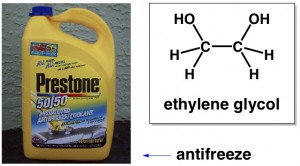- Joined
- Jun 23, 2013
- Messages
- 958
- Reaction score
- 413
Why does Ethylene Glycol (the component of antifreeze), have a lower freezing point than water? Wouldn't you expect a higher melting/freezing point and boiling point due to the increased presence of hydrogen bonding and molecular weight?

Wikipedia says:
Melting point−12.9 °C; 8.8 °F; 260.2 K
Boiling point197.3 °C; 387.1 °F; 470.4 K
Boiling point of ethylene glycol is higher as predicted, but the melting/freezing point is less than water (lower than 0 °C). That's a little contradicting, don't you think?

Wikipedia says:
Melting point−12.9 °C; 8.8 °F; 260.2 K
Boiling point197.3 °C; 387.1 °F; 470.4 K
Boiling point of ethylene glycol is higher as predicted, but the melting/freezing point is less than water (lower than 0 °C). That's a little contradicting, don't you think?
